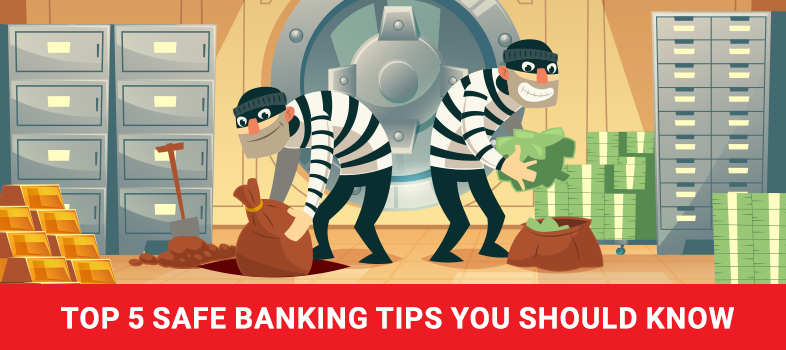Kudos to the digitization today that banking is now easy & fast! While banking is swiftly available on the go, it has also encouraged banking frauds to rise. we need some essential banking tips to ensure better safety of our transactions.
The Government has played an instrumental role to spread the digital word in the remotest parts of our country. Even the banks have greatly contributed to convert this into reality & offer online banking to urban & rural India. We experienced an increase in the number of bank accounts of Indian citizens. However, this has also sharply increased the number of banking frauds per se.
It could be identity theft, phishing, vishing, skimming, and many more of such malpractices which can create a ruckus for the customers if cheated. If you have deeper concerns for your account safety, then you must pay attention to the following online banking tips & circulate it too.
1. Safety of Debit and Credit Cards
Certainly, debit and credit cards have remarkably eased our lives. However, to ensure their safety & protection is in your hands. The tips highlighted below can be beneficial:
- Change your Debit & Credit Card PIN often
- Allow swiping your card for a purchase in your presence & check it before making an exit
- Keep alert to not share your PIN ever, and avoid writing it anywhere for others to see
- Immediately register a complaint when you lose your card
2. Averting phishing and vishing scams
To be able to enable safe online banking, you must understand the meaning of phishing scams. Under such scams, you usually receive a phishing email or call from a con bank representative, asking for your sensitive information. This communication looks very similar to how your bank usually intimates/ informs you.
Just remember that a bank will never send you deceiving emails or ask for confidential banking information. Avoid clicking on such links & don’t share details like PIN, banking password with just anyone.
3. Keeping your bank account running
Fraudsters mainly target bank accounts that have been inactive for a long time. Such dormant accounts get absolutely no attention for you and which is why they top for online scams & frauds. Do not wait for such calls to pester you when you’re accounts aren’t active, rather keep an eye. And if at all, you do not use a bank account, let go of it! Frauds like money laundering and other illegal transactions can be performed using bank accounts.
Kindly update your contact details in case you’ve made a change.
4. Carefully select the PIN and Password
All young professionals are well-versed with electronic banking which is quite popular. So, if you are used to online banking, then be very careful with Debit/Credit Cards for withdrawals, transfers, and payments. Choose your passwords and PIN with extra caution, a password that is different to guess. Do not use basic information about oneself for keeping PIN or password and change it frequently.
5. Online banking safety comes first
Even if you’re in a rush, avoid accessing your bank account on a public network through a cybercafe or a new location. Also, keep your browsing history clean when you’re outside & logging in. Avoid shopping from untrusted portals even when your need is urgent.
Banks/Financial institutions regularly take actions to provide a secure and convenient banking experience to its customers. So, it’s also the customer’s responsibility to play their part & protect themselves against frauds. Keep the above-mentioned tips in mind for safe banking and quickly contact your bank if you observe any suspicious activity related to your bank account.

